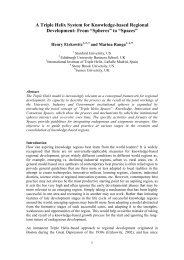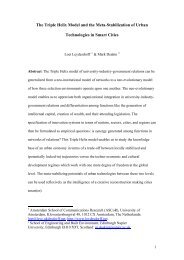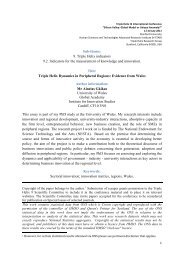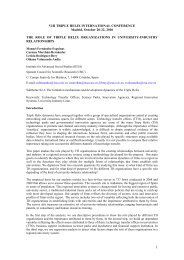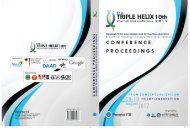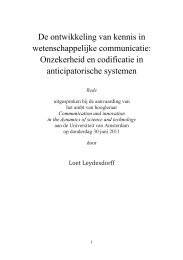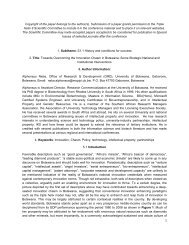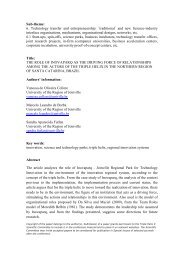TRIPLE HELIX noms.pmd
TRIPLE HELIX noms.pmd
TRIPLE HELIX noms.pmd
You also want an ePaper? Increase the reach of your titles
YUMPU automatically turns print PDFs into web optimized ePapers that Google loves.
O-041Towards a Knowledge Society:Expanding the Role of Women in Science, Technology and Engineering in theUnited Arab EmiratesDiana Samulewicz, Noor Ghazal Aswad, Masdar Institute of Science And Technology, United Arab EmiratesIntroductionEconomic diversification and the transition towards a knowledge-based economy, where innovation is at the core, has been arecent aspiration of the UAE authorities. Human capital is essential for such transformation to take place, reason for which theUAE government has expressed commitment to improving the skills of the national workforce, increasing employability and tomaximizing the participation of nationals, especially women in the labor market [1].However, such an economic transformation process is a complex undertaking, and there are several challenges ahead. First,there is an increasing knowledge gap in the Gulf region due to: (a) insufficient investment in R&D; (b) low student enrolment inhigher education; and (c) low quality of education in science and engineering [2]. Second, it is argued that the Emirati laborforce is inadequately educated and has a poor work ethic [3]. Third, UAE nationals make only 20.1% of the UAE population [4].Consequently, UAE continues to attract skilled and unskilled foreign workforce to meet its evolving development needs. Yet, itis unlikely that the economic transformation will be successful without developing a national workforce and reaching out toEmirati women.State of art about topicIntegration of women in STE (Science, Technology and Engineering) education and labor market has proved to be highlycorrelated with the level of innovation and entrepreneurship, as reflected by the experience of advanced knowledge economiessuch as Scandinavian countries [5,6]. Hence, more research is needed to understand how women can support the economictransformation process in the UAE.Currently, their role is limited. Although, there are more women than men in secondary and tertiary education in the UAE [7,8,9],Emirati women only make up 13% of the overall UAE workforce [1].The mismatch between education supply and market demand – women’s preference to study social sciences, humanities andlaw, and demand for STE skills [1,10,11] – is one of several factors contributing to low women’s economic activity in the UAE.It is crucial, therefore, to understand what determines women’s choices of academic programs, economic sectors and types ofjobs.Earlier studies account for the following factors to explain the low participation of women in the STE field: (a) socio-psychologicalfactors; (b) school influences; (c) other (outside the school) influences: i.e. cultural stereotyping, lack of role models. Wehypothesize that there may be some additional factors related to the local socio-economical context.Research focusOur paper is the first study in the region to systematically examine factors that affect: (a) Emirati women’s decision regardingthe degree program that they intend to pursue; (b) Emirati women’s attitudes towards science, technology and engineeringeducation; and (c) career decisions of Emirati female undergraduate and graduate students. We aim to put forward culturallysensitive and informed conclusions and recommendations for the UAE education policy-makers regarding ways to integratewomen into the knowledge society, in order to support innovation and entrepreneurship.MethodologyWe take an interpretative research paradigm to assess why a large share of Emirati women follow a certain behavior. Our unitsof analysis are women students enrolled in local universities, local educators, education policy-makers and employers. Toexplore our research questions we use mixed research methods: (1) survey methods to systematically collect data on specificissues related to women’s choice for discipline specialization and career paths; and (2) qualitative research (semi-structuredinterviews and focus groups) to examine the set of factors driving individual choices.Findings, implications and contributionsWe argue that low supply of national high-caliber graduates in STE will further hinder the economic transition process towardsan innovation-based economy. In addition, it will place greater pressures on the government and firms located in the UAE tocompete for talent on the global labor market. Therefore, education and employment of Emirati women should be gearedtowards supporting the economic transition process. However, to prepare women for effective integration into the labor market,a strong link between education policy, economic development strategy as well as local culture and social values is required.To our knowledge, there are no studies dedicated to the tertiary education choice and career decision made by Emirati girls thatMadrid, October 20, 21 & 22 - 2010297



